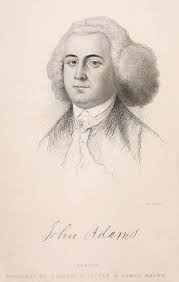Author: John Adams
Date: April 8, 1768
“And the said Joseph Warren agreeing that s[ai]d Phillip may give any special matter in Evidence and in general and upon the said Phillip agreeing that he may wave this plea & [substitute] with that plea of s[ai]d Phillip before pleaded insufficient in law to preclude him s[ai]d Joseph from maintaining his Action & that he is not holden by Law to make his Answer thereto: & that he is ready to verify: & thereof he pray Judgment [signed] John Adams”
Source: I thank Tamesin Eustis for bringing this to my attention, and for agreeing to share it here with fellow followers of Dr. Joseph Warren on the Web. Ms. Eustis encourages a diverse group of endeavors, running the gamut from written non-fiction, to historical fiction, a web comic, and living historians. Specific to Joseph Warren, she is a descendant of his medical apprentice, Spunker, and later a distinguished politician, William Eustis.
Ms. Eustis recalls this document as being on display at Sotheby’s auction house in New York City during mid-June of 2006, though the exact year may not be recollected precisely. It was identified as auction lot #142 in Sotheby’s Americana Books auction catalog for 2003. The document is signed by John Adams and is partially printed. It summons one Phillip Freeman of Boston to appear in the court of common pleas. The document is probably in private hands, present whereabouts unknown.
The likeness of a young John Adams is an old engraving after Benjamin Blyth’s pastel circa 1766. The original Blyth is displayed at the Massachusetts Historical Society.
Commentary: All too often auction catalogs are not systematically indexed nor freely available to scholars. Documents such as this one, despite historical and biographic interest in otherwise undocumented episodes, may surface briefly at auction before submerging again into inaccessible private hands. The catalogs themselves can be better known in hard copy to art historians and collectors, than they are to historians and biographers. Ms. Eustis captured enough of this document while it was on public display briefly, that, when the appropriate Sotheby’s Americana or manuscript auction catalog is found, we can hope it will contain a likeness of this document.
The transcription reveals that John Adams is acting as attorney for Joseph Warren in a case heard before the court of common pleas, presumably in Suffolk County or Boston. The context and content of the dispute with Phillip Freeman is currently unknown. Was this a straightforward business dispute or something with political implications? The young John Adams was involved in a number of such cases heard in Massachusetts circuit courts. The ascerbic Loyalist Peter Oliver derisively characterized John Adams as a “pettigogger at the law.”
Joseph Warren’s account books reveal four clinical visits with a Mr. Freeman between June 4th and 26th 1767 for a total charge of 12 shillings. Freeman is a common name and the amount is not large enough that one might expect the debt to become the subject of litigation. The clinical charges may have nothing to do with this Freeman or the litigation. In 1766 a Phillip Freeman was elected as a Boston town warden. Several advertisements for printed sermons appeared in Boston newspapers between 1766 and 1771, referring to a Phillip Freeman as publisher.
The time frame is of interest. Joseph Warren became aligned formally with Whigs by late 1767. He achieved notoriety as the pseudonymous Whig A True Patriot. Public proceedings of 1767 and early 1768 involved increasing Whig ire against the Townshend duties and Governor Francis Bernard. These led to the summer of 1768’s Convention of the Towns and the first British Army occupation of Boston by the Fall.
John Adams’ friendship with Dr. Joseph Warren dates to the former’s inoculation with smallpox in 1764. It later included legal dealings as documented here, business dealings, and shared Patriot political activism. John Adams looked up to Joseph Warren as a very capable and involved citizen, and trumpeted Warren’s legacy long after Warren’s demise at the Battle of Bunker Hill.

 Follow
Follow